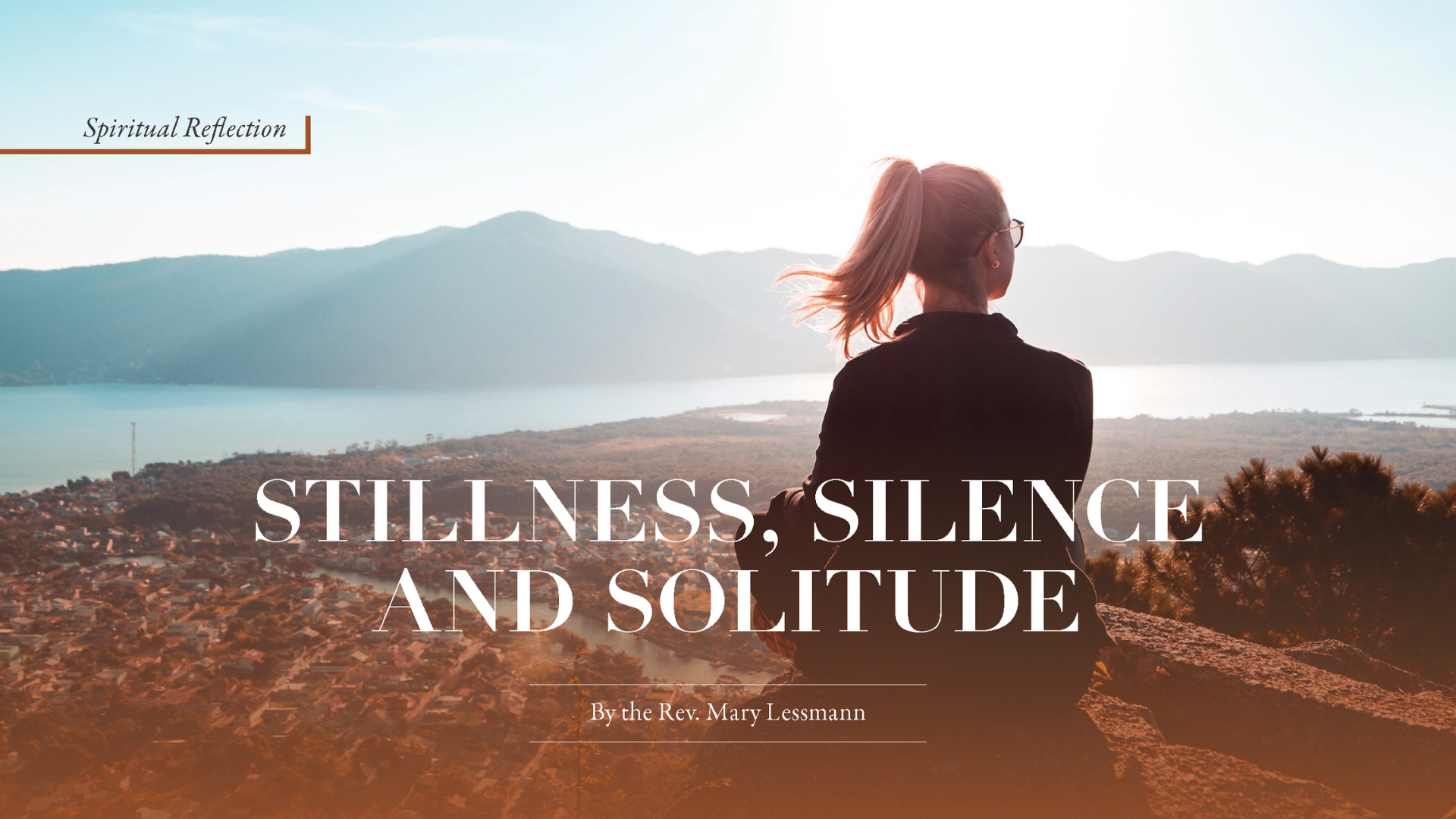
Stillness, Silence and Solitude by the Rev. Mary Lessmann
"Our Adversary majors in three things: noise, hurry and crowds. If he can keep us engaged in “muchness” and “manyness,” he will rest satisfied."
- Richard Foster
We are entering summer, and so for many of us, the pace of life is becoming a little less hectic. But in today’s world, that might not be saying much. We are people who live very busy lives. And while we might sigh heavily as we tell people how busy we are, we often wear our busyness like a badge of honor. We determine how well we’re ‘doing’ life by the fullness of our calendar; by the number of experiences we’ve lined up; by the number of nights we’re not home without plans. And the world around us seems determined to affirm that value system. We are regularly reminded of the need to check in with others on social media, of the new hobbies and skills we should be developing, of baseline acquisitions necessary for a happier life.
And yet we know this is not the example of Jesus. We know that in the midst of Jesus’ busy ministry of healing and teaching and group meals and traveling around the countryside he regularly went off to a quiet place to rest and to be in silence and solitude. And we know that Jesus desires that his followers do the same (Mk 6:31). And yet the world will never encourage this in us. We live in a world where stillness, silence and solitude are in short supply. At best they are seen as unproductive and frivolous; at worst, they are seen as suspect.
If we would nurture our relationship with God, if we would become more the people he has created us to be, we would cultivate these disciplines in our life. We should not be surprised that it is difficult for us, that it feels like swimming upstream, because they are disciplines. If they were easy to live into they wouldn’t be disciplines, they would be entertainment or fun experiences. So how do we live into Jesus’ desire that we create margins of stillness, silence and solitude in our lives while spending our days and weeks and years in a world that will not affirm that for us?
In stillness, we learn to stop doing, stop producing, stop pleasing people, stop entertaining ourselves and stop obsessing. In the hamster-wheel pace of our lives, we can avoid self-reflection. Sometimes the busyness of our lives masks a fear of resting in God’s presence and the presence of our own thoughts. Our unremitting activity can be a way for us to check out of life. Instead of using booze or sex or food or tv, we anesthetize with activity. If we’re always running our kids to practice or working long hours or streaming episode after episode of the latest show, we don’t have to sit with God and lay bare what rises in our thoughts and heart. If we keep really busy, we don’t have to deal with our pain or our emptiness or our sadness.
Many of us have some soundtrack running in the background of our lives practically all the time. We have the TV on at home. We have the radio on in our cars. We listen to podcasts when we’re out exercising. There is a connection between the amount of noise in our lives and our inability to hear God.
In silence our desire is to listen for God; to invite God to work within us that we might be transformed. The silence we seek is both external and internal. So, not only do we find a space that is quiet, but we also deal with all the noise that arises from within. As your mind wanders to your grocery list or the conversation you had yesterday with a colleague, gently bring your mind back to emptiness. It may feel as if you spend your entire time with God pulling your mind back to silent presence. That’s ok. It is a mysterious thing that God honors our offering of silence, working in us over time to form us more into the shape of Christ.
In solitude we are given the opportunity to know ourselves; to return to our true selves, as Richard Rohr describes, “before we did anything wrong, and before we did anything right.” Solitude can bring to the surface inner conflicts, distress and longings. We might have to ask, “Who am I apart from what I do or who I’m with?” Solitude provides a space where we can stand back from our life and see it whole. Where we can make unexpected connections and experience the lightning bolt of inspiration. A regular practice of solitude helps us stay centered so that when we come to the big events in our lives or must make difficult decisions, we can do so from a place of being grounded in our calling and life’s purpose.
The fruit of the disciplines of stillness, silence and solitude is love of God and others. If we are intentional about incorporating these in our lives, we’ll love others better. We’ll be better able to control our tongues, to control our tempers, to manage our desires and appetites, to have more compassion for others, to have space for differing opinions and understandings. As Isaiah tells us, “In returning and rest you shall be saved; in quietness and trust shall be your strength” (Is 30:15). May this summer be for you and those you love a time of increased stillness, silence and solitude.
**This article was written by the Rev. Mary Lessmann and was featured in the 2022 Summer Archangel.
Other Articles In This Issue...
507A by David Boldrick
For those that may not be aware of this significant ministry, Saint Michael is an active partner in the Meals on Wheels (MOW) delivery program here in Dallas which is operated by VNA, the Visiting Nurses Association. I’d like to share a bit about MOW, and what it can do for those in need—but also what it can do for you.
Who We Are Becoming by the Rev. Dr. Christopher D. Girata
This past year has been a pleasure and privilege as we look back. Now, it’s time we pivot forward as we become the church we are called to be in the future. Our journey forward will take courage, conviction, and commitment, but we have everything we need. We know that Jesus is with us, giving us strength for all that we hope to do and who we hope to become. Together, we can move confidently into a future that is bright and hopeful, and as we do, spread the Good News to all we meet.


